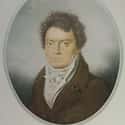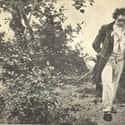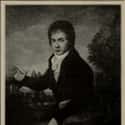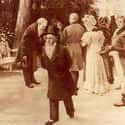-
(#10) He Started Going Deaf At The Same Time He Became Immensely Popular
Beethoven's move to Vienna was a wise decision. He studied with the most respected composer of the period, Joseph Haydn, and generated enough support from Viennese patrons to cut ties with Bonn. His first public performance in Vienna, in March 1795, and subsequent published pieces, were a resounding success. His Symphony No 1 in C major, performed in Vienna in April 1800, made him one of Europe's most famous composers.
Yet as he rode the gilded rocket of fame ever upward in the skies of European celebrity, Beethoven was grappling with a terrible secret: he was rapidly losing his hearing. The deterioration was so rapid, he could barely hear words in a normal conversation at the age of 30. In a letter from 1801, he wrote:
"I must confess that I lead a miserable life. For almost two years I have ceased to attend any social functions, just because I find it impossible to say to people: I am deaf. If I had any other profession, I might be able to cope with my infirmity; but in my profession it is a terrible handicap."
Despite his worsening handicap, Beethoven enjoyed the most productive period of his life from 1803 until 1812, composing an opera, six symphonies, four solo concerti, five string quartets, six string sonatas, seven piano sonatas, five sets of piano variations, four overtures, four trios, two sextets, and 72 songs. This flurry of activity ranks as one of the most productive periods in the life of any musician. That Beethoven accomplished it while practically deaf is truly remarkable.
-
(#15) For A Change of Pace, The Premiere Of Beethoven's Ninth Was Remarkably Poignant
In 1824, Beethoven wished to premiere his Symphony No. 9 in D minor, Op. 125 (Choral) in Berlin. He felt Vienna had become more hospitable to Italian composers, and his style of music would be more appealing elsewhere. He relented when a petition signed by fellow musicians and arts patrons urged him to change his mind. The premiere was set for May 7, 1824.
The performance was set to be Beethoven's first stage appearance in more than a decade, and would require the largest orchestra yet assembled by the composer. It was also one of the longest, most complex symphonies yet written, and the only symphony by a major composer to incorporate vocal work. While Beethoven was officially the conductor, another conductor, Michael Umlauf, was also on stage. It's believed the musicians were instructed to ignore Beethoven. According to one of the musicians in the orchestra:
“...he stood in front of the conductor’s stand and threw himself back and forth like a madman. At one moment he stretched to his full height, at the next he crouched down to the floor. He flailed about with his hands and feet as though he wanted to play all the instruments and sing all the chorus parts.”
There are many anecdotes about the performance, most probably apocryphal, but there is no question the piece was a tremendous success. As the final notes faded from the air, Beethoven was focused on the orchestra and unable to hear the tumultuous applause. A member of the chorus turned him around so he could observe the jubilation. The were five separate ovations, and waving hats and handkerchiefs and a sea of raised hands were on display to ensure the composer knew how much the audience loved his work.
-
(#2) His Tutor, Tobias Pfeiffer, Was A Weirdo Who Made Him Practice In The Middle Of The Night
In 1779, when Beethoven was nine years, an eccentric musician named Tobias Friedrich Pfeiffer moved into the Beethoven household. Pfeiffer had recently moved to Bonn and befriended Ludwig's father, who thought Ludwig could benefit from Pfeiffer's tutelage.
Pfeiffer taught Beethoven for one year, during which time he recognized Ludwig's talent and helped him improve greatly as a musician. However, he was apparently a very disagreeable man with a habit of forcing Ludwig to practice at strange hours. According to some sources, Pfeiffer was an insomniac, and would drag Beethoven out of bed in the middle of the night for lessons.
Beethoven biographer Tilman Skowroneck argues Pfeiffer was a positive influence on Ludwig the musician and composer, despite the negative effects he had on the young boy's psyche. According to primary sources Skowroneck cites, Pfeiffer was a gifted musician and the primary source of Beethoven's formal musical education as a child.
-
(#16) He Was A Heavy Drinker And Died In Agony, But No One's 100% Sure About What Killed Him
Beethoven's maternal grandmother and father were alcoholics, so it's not surprising his autopsy showed he died from cirrhosis of the liver. In his final days, he suffered from ascites, an accumulation of fluid in the abdominal cavity, a result of cirrhosis that causes gross swelling. Yet cirrhosis has numerous causes, so which one did Ludwig have?
As an adult, Beethoven drank every day, concluding each evening with a trip to the local tavern. Among other beverages, he drank a lot of wine, which at the time was laced with lead to provide cheap product with a better taste (the practice was illegal even then, but still widespread). Beethoven's chronic drunkenness probably explained his mood swings, hostility, and depression. Coincidentally, his nephew, Karl, also died at a young age from liver-related complications.
Of course, not everyone agrees with the death-by-alcoholism diagnosis. According to a New York Times article from 2010, while Beethoven was certainly ill and suffering from liver problems, there has yet to appear irrefutable evidence of his exact cause of death.
-
(#17) No One Knows What His Last Words Were But There Are Some Wild Theories
Beethoven died on March 26, 1827. There are major discrepancies as to who was present, what was said by Beethoven, and even his state of mind. One biographer's account uses the weather and composer's final moments to create a bombastic drama in keeping with the tone of Beethoven's music:
"At this startling, awful peal of thunder, the dying man suddenly raised his head from Hüttenbrenner's arm, stretched out his own right arm majestically—like a general giving orders to an army. This was but for an instant; the arm sunk back; he fell back; Beethoven was dead."
Several last words are attributed to Beethoven; which ones you read all come down to the source you're reading. One account has him saying "Pity, Pity - too late," upon hearing about a gift of a case of wine from his publisher.
"Applaud, my friends, the comedy is over," spoken in Italian to mimic the Commedia dell'arte, seems like a stretch for a dying man, but someone claims he said it. He may also have uttered "I shall hear in heaven." certainly appropriate final words for him.
-
(#14) His Disdain For Authority And Pretense Ruined His View Of A Literary Hero
Beethoven was naturally predisposed to resisting authority. Like many of his generation, he was ideologically influenced by the French Revolution. He hated being told what to do and disdained all forms of social pretense or hierarchy. If asked to perform at a social gathering, he would resolutely refuse and, in some cases, storm out. His refusal to follow the norms of bourgeoisie and aristocratic etiquette was so profound, Archduke Rudolph, a patron of the arts and supporter of Beethoven, exempted him from the rules of the court.
This stubbornness also applied to Beethoven's conception of himself as an artist, and his ideas of the role of the artist in society. In his mind, the artist stood apart from all others, a special class of people endowed with special gifts. He dubbed himself a Tondichter ("poet of sound") and accorded the same respect and status to fellow artists. His image of artists worked against him in some instances, though. When Beethoven met Johann Wolfgang von Goethe, who he esteemed as the greatest of poets, he was disturbed to see the writer behaving deferentially with royals. This ruined his conception of Goethe.
New Random Displays Display All By Ranking
About This Tool
Beethoven has been away for more than 200 years, almost everyone in the world knows his name and music. All the modern musicians are still fascinated by his beautiful music and touching melody, but few people know how tragic his life has been. Beethoven spent his childhood under the strict and demanding education of his father, which created his stubborn, sensitive personality. When his music career began to develop, he was hit by fate again, he was deaf.
He has almost never heard of his own work. After his deafness, he tried his best to avoid any social activities. If a musician cannot hear his own work, what could be more cruel torture? The random tool shares 18 sad facts about the miserable life of Beethoven.
Our data comes from Ranker, If you want to participate in the ranking of items displayed on this page, please click here.
















